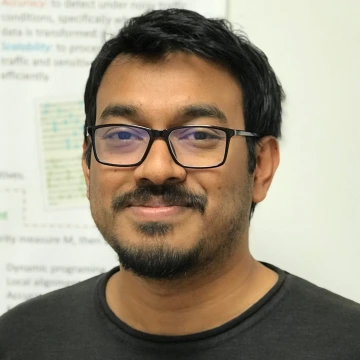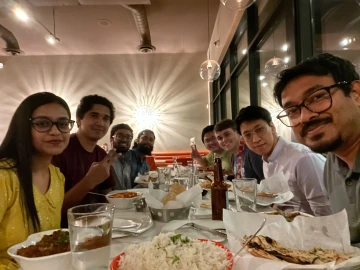Faculty Spotlight : Sazzadur Rahaman
Spotlight interview with Assistant Professor Sazzadur Rahaman

Sazzadur Rahaman is an assistant professor in the Department of Computer Science at the University of Arizona, where he leads the Security Privacy and Reliability (SPR) lab. He is interested in researching security and privacy problems with critical societal impacts. Before moving to Tucson, he obtained his Ph.D. from Virginia Tech.
Where are you originally from?
I am originally from Bangladesh. Bangladesh is known for its rich cultural heritage and seasons with distinctive features, which are celebrated in literature, music, and art. I grew up in a rural locality in Noakhali District and moved to Dhaka in the quest for better education. I completed my 12th grade and undergraduate degree there.
Growing up, what did you want to be?
I wanted to be a Pilot. Airplanes fascinated me as a child. Even now, when I ride airplanes, each takeoff amazes me – thinking about how we have operationalized Newton’s third law of motion. As a child, I gave lots of credit to Pilots for flying this giant machine (hahaha) until someone pointed out that it was the engineers who made it work! That shifted my interest towards engineering. Fast forward to my 12th grade in 2006 – Computers and the Internet took over the world, and I found a new fascination. I am sure; in an alternate universe, I am an Aerospace Engineer.
What attracted you to academia?
During my undergraduate years at Bangladesh University of Engineering and Technology (BUET), I got spoiled with exposure to the world of research, thanks to my undergraduate research supervisor, Prof. Saidur Rahman. Looking back, one of the most enjoyable times of my undergraduate life was spending time with research problems. Needless to say that I enjoy living inside my head and pushing scientific frontiers. An opportunity to do that for a living – what can be more delightful than this?
Can you tell me a little about your research and what led you to your field?
After completing my undergraduate, I briefly worked as a software engineer and led the development of software systems that are currently used by millions of people every day. During that time, I came across the book “The Art of Deception” by Kevin Mitnick (Who is Kevin Mitnick? – If you know, you know), which changed my view of looking at software. This played a pivotal role in choosing Computer Security as the topic for my doctoral dissertation (under Prof. Daphne Yao), which is the primary focus of my research lab. Specifically, I work on foundational problems to make security and privacy practices more democratized, transparent, and affordable.
What projects are you working on right now?

Security as a "feature" is expensive, which prevents organizations with limited resources and budgets from accessing it. Currently, several ongoing projects are focusing on making security affordable. The primary focus is to enable domain experts to design security screening tools without knowing the internal details of how software reasoning works. It's like giving chefs a pre-programmed robo-cooker (I wish I had one), where chefs’ responsibility is to write the recipe without needing to know about how the robo-cooker actually works. In the process of building those technologies, we helped numerous companies and open-source projects to improve their security.
Additionally, we are also studying other barriers to adopting security practices. By addressing these obstacles from different fronts, our goal is to enhance baseline security in critical domains like payment, healthcare, education, and communication technologies. For example, in one of our recent studies (in collaboration with ASU), we found that higher education institutions (it includes our beloved one, too) largely depend on software vendors to uphold security and privacy practices as outlined in the contracts they sign. However, these institutions often lack visibility into whether these practices are actually being followed. Now, we are building technologies to enable transparent and seamless oversight and auditing capabilities.
Another research strand focuses on minimizing the negative impact of AI technologies in security applications and societal contexts. Here, we focus on either exposing AI’s fundamental weakness to solve security problems or building innovative applications by riding those weaknesses. For example, one of our projects aims to develop techniques to empower instructors to AI-proof their homework problems. We do that by reducing the usefulness of AI tools (i.e., ChatGPT) in solving them. For this, we leverage the fundamental weakness of AI tools by introducing subtle-often-imperceptible changes in the assignment to mislead AI systems. One interesting fact about this project is that it was sparked by a casual coffee shop chat with Prof. Saumya Debray about the impact of ChatGPT-like systems on our introductory courses.
What do you enjoy most about your work?
The “eureka” moments, especially when it comes from my student. Nothing gives me more pleasure than seeing my students come up with interesting ideas or convincing me to revise the course of action. I also enjoy reading emails from my former students, who took classes with me. Learning about how those classes made a lasting impact is a treat.
What advice would you give to an aspiring educator/researcher?
I tell my students who are starting their research career that it’s more of a lifestyle than a profession. Thus, initially, they should put most of their efforts into learning the craft of doing research as well as adjusting to this lifestyle. In the early years, it's more important to focus on building intuition and developing intuition-driven skepticism. This includes asking thoughtful questions and developing a research taste. Establishing consistent habits to make steady progress is equally important. In the long run, these foundations matter more than quick early publications. With all these qualities to consistently produce high-quality works, publications and other accomplishments will eventually follow.
How do you like to spend your free time?
I enjoy spending time with my family and creating memories with my 3-year-old daughter. I also like hiking. Currently, I am preparing for my first backpacking trip to the Grand Canyon (a bucket list item).
What would people be surprised to learn about you?
Outside of research, I have a passion for cooking. I like cooking traditional Bangladeshi dishes. I also enjoy creating new recipes (or sometimes disasters) by experimenting with spices from around the world.

